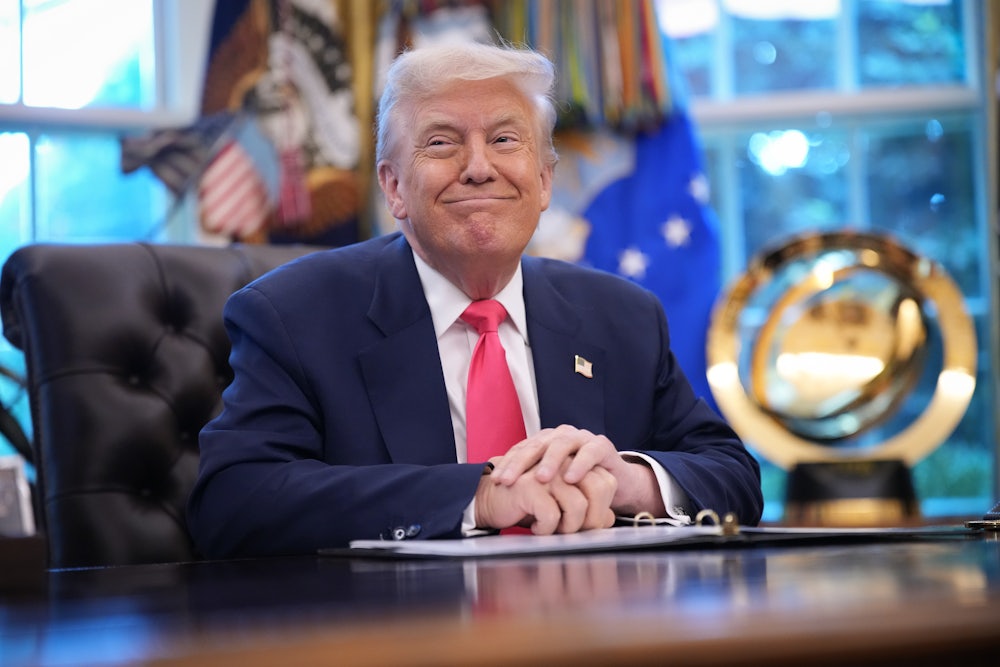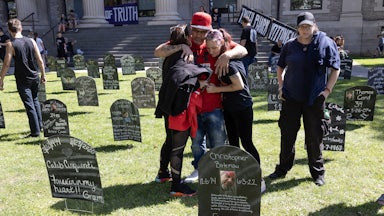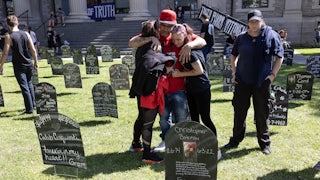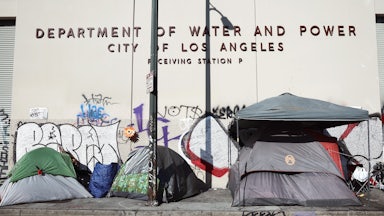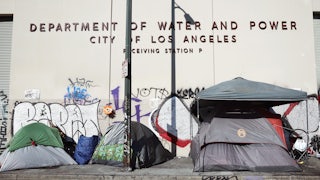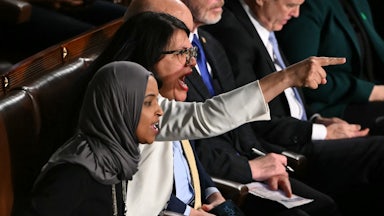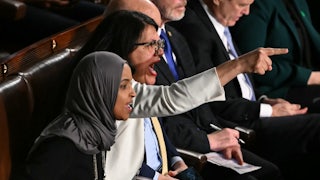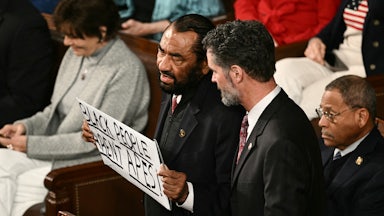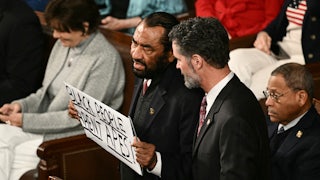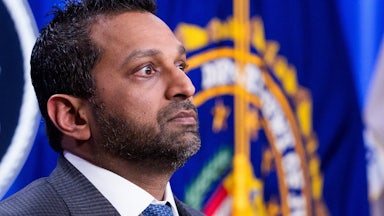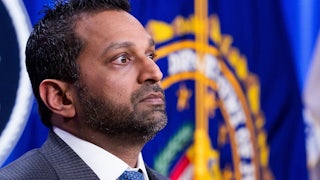Under President Donald Trump’s guidance, federal authorities have stepped up their attacks on homeless Americans this past week, with a move to clear encampments in Washington a centerpiece of the multi-agency crackdown underway in the nation’s capital. Last Thursday, federal agents, backed by police, went after unhoused people in Washington Circle and near the Kennedy Center, in operations that were staged overnight when fewer watchful eyes would be present. As the federal push into the capital takes hold, it’s the homeless who find themselves at the tip of the authoritarian spear as Trump’s paramilitaries single them out.
This is by no means the first time Trump has railed against homeless Americans, but it is the most drastic use of force he’s carried out against them. After days of ramping up his rhetoric, he unleashed various federal agents from the FBI, Customs and Border Protection, and the Drug Enforcement Administration in the name of fighting crime—despite the record-low levels D.C. is currently enjoying after a deadly 2023—and going after the homeless population. Trump’s rhetoric and use of state power against the most vulnerable isn’t unique to him, or even the Republican Party. Rather, it’s an escalation of a bipartisan antipathy to the homeless that’s become increasingly prevalent over the last year.
Across the country, local governments are trying to address homelessness not by tackling the affordability crisis, or the lack of shelter and housing, but by pushing for “out of sight, out of mind” tactics. The president, if anything, is merely building on their groundwork.
“Our capital city has been overtaken by violent gangs and bloodthirsty criminals, roving mobs of wild youth, drugged-out maniacs, and homeless people,” Trump said last Monday at his press conference announcing the surge in law enforcement and troops. Prior to that, he’d posted an ultimatum that unhoused residents of the District needed to leave the capital. (They could even get help, he said, but they had to be far away from D.C.)
Throughout the buildup to the deployment of federal law enforcement agents across the city, Trump continually likened not having a place to sleep with unlawfulness, and repeatedly conflated the state of homelessness with crime.
So now the troops have been sent out into the streets. The agents are ambling around the city, arresting people seemingly at random and getting at least one sandwich thrown at them by an angry resident. Meanwhile, the city’s homeless population (around 5,100 per the latest point-in-time homeless count, the overwhelming majority of whom are in shelters or temporary housing, per the data) finds itself vulnerable to enhanced sweeps.
It would be easy to call Trump’s actions unique. Unquestionably cruel and horrific, they rely on the power of the presidency and control over levers of power most other officials don’t have. But Trump benefits greatly from the years of growing bipartisan consensus around the country from people who would rather push homeless Americans out of sight than actually address inequality and poverty—that is to say, address the policy mistakes that bipartisan legislators at all levels of government have made over the past decade that have created and fostered America’s homelessness crisis.
Trump nodded to this consensus in an executive order he gave in July addressing “crime and disorder on America’s streets.” It described “endemic vagrancy, disorderly behavior, sudden confrontations, and violent attacks [that] have made our cities unsafe.” While the order was written with the familiar Trumpian patois, it really wasn’t much different from what some state and local governments had put out in the last year since the Supreme Court’s 2024 ruling in the City of Grants Pass v. Johnson case.
That decision said that it wasn’t a violation of the Eighth Amendment to ban outdoor camping, even if there were no shelter beds or places to be offered to people sleeping on the streets. It essentially gave local governments the opportunity to criminalize homelessness, a privilege that they had been itching to use and quickly did after the Supreme Court gave the green light. More than 200 local laws were swiftly enacted, criminalizing people for having nowhere to sleep. They ranged from Phoenix to San Francisco, with no clear divide between Republicans and Democrats in how these laws rolled out.
In California, Governor Gavin Newsom—while a high-profile Trump critic on other issues—helped pave the way for Trump’s own escalation on the homeless by ordering state agencies to clear encampments “with urgency,” coupled with threats to city and county governments that the state would withhold funding unless they complied. “This is not about criminalization,” Newsom said at the time, even as he pushed for de facto criminalization over the more effective but slower process of building housing and getting people into shelters with services. Some cities took action without Newsom’s prompting. In San Francisco, the city began issuing bus tickets before offering housing or shelter, in another case of prioritizing “out-of-sight” policies rather than housing.
Trump has a long history of animus toward the unhoused, even suggesting setting up internment camps far outside of cities as a place to put people, even involuntarily. Naturally, none of his proposals actually tackle the affordability crisis or any of the underlying causes of homelessness; his issuing of ultimatums for the homeless to leave Washington, D.C., did not offer any explanation as to how such a migration would be made convenient. So far, Trump has not set up his proposed internment camps for the homeless (although his administration clearly has shown a capacity and willingness to set up similar facilities as part of its sweeping mass deportation efforts). Instead, his targeted actions in D.C. feel like an extension of what mostly liberal governments have done in California.
Before he announced the military mission, Trump’s anti-homeless screed claimed that the administration would provide help for people who left their lives in the city. “We will give you places to stay, but FAR from the Capital.” Keep in mind that many people on the streets in D.C., as with other places, have jobs along with other ties to the city they live in. Being forced to leave could impact their income, relationships, and their overall ability to claw themselves out of the precarity that left them on the streets.
None of this seems to matter to the White House. The Trump administration has not elaborated on any sort of help it might offer. Press secretary Karoline Leavitt said this week that unhoused people will “be given the option to leave their encampment, to be taken to a homeless shelter, to be offered addiction or mental health services.” If they don’t, they “will be susceptible to fines or to jail time.”
That is not federal help. That is an ultimatum to leave or be punished. Of the roughly 5,100 people who are homeless in the capital, approximately 15 percent are unsheltered and on the streets. The city does not have enough shelter beds to house everyone. One unhoused D.C. resident, whose encampment was photographed and shared by Trump, noted he was forced to leave when the area was cleared, only able to get a motel room for a few nights thanks to a donation from someone. So what are the options for hundreds of people already experiencing poverty? It seems to be either paying for something they likely can’t afford or go to jail. Either way it’s a guaranteed punishment.
“People without homes have the same legal and constitutional rights as anyone else in this country—to be free from unlawful search and seizure, to have due process, to have the right to travel, and the right to choose which jurisdiction to live in,” Amber W. Harding, executive director of the Washington Legal Clinic for the Homeless, said in a statement. She affirmed that D.C. does not have enough shelter beds for everyone on the street.
Should this population manage to leave the city, they still won’t have homes and could easily find themselves targeted in other state and local governments’ draconian homelessness policies. Encampment clearings are damaging. Tents might go away, but the people who are displaced end up hurt. Belongings, including medicine, IDs, and important documents, often get seized or destroyed, which makes it even harder for people to survive while homeless or get themselves out of homelessness.
But that’s the way of doing business in America, and it’s been handed down to President Trump from lawmakers and officials in political parties of all sides across the country.
So what is the end game? Is the administration looking to fill local jails with impoverished people, or send them to new, remote internment camps as it has teased? If Democrats want to undercut Trump’s arguments and actually address poverty, will they focus on social services and affordability, or stick with Trump’s reactionary rhetoric and autocratic use of the police? Either way, homelessness in America is a failure with many fathers, exacerbated by a bipartisan policy consensus that laid the foundation and provided the precedent for what’s currently happening in D.C.
